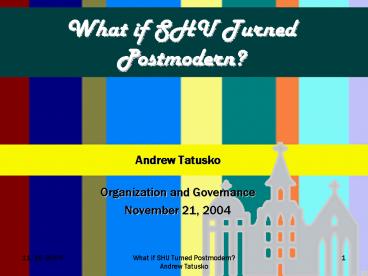What if SHU Turned Postmodern - PowerPoint PPT Presentation
1 / 20
Title:
What if SHU Turned Postmodern
Description:
Catholicity ' ... Catholicity is one discourse among many that has no suitable foundation that can ... Hall Statement on Catholicity. http://president.shu.edu ... – PowerPoint PPT presentation
Number of Views:68
Avg rating:3.0/5.0
Title: What if SHU Turned Postmodern
1
What if SHU Turned Postmodern?
- Andrew Tatusko
- Organization and Governance
- November 21, 2004
2
Sorting Out the Assumptions
- Seton Hall is not currently postmodern.
- Postmodern theories challenge the basic
foundations of modernity. - Postmodern theories challenge fundamental aspects
of the current organizational structure of Seton
Hall. - What follows is both exploratory and a thought
experiment.
3
Three Areas that Postmodernism Challenges
Community
Autonomy
Merit
4
Community in General
- The university seeks to form a community formed
around intellectual pursuits. - The university forms a student community and a
student culture. - The university has general principles or
ideologies that hold the structures unity
together. - The organizational saga and the cultural
dimension of the organization hold these notions
together.
5
Community _at_ SHUIn General
- Our mission is to prepare students to be servant
leaders who will make a difference in the world,
and our entire community embraces this
commitment. - As John Henry Newman argued, the true
University, a Catholic university in which
theology is a branch of knowledge, offers deeper,
broader teaching in the disciplines other than
theology, through a sense of the unity of
knowledge, of history, of religion and of the
moral life.
6
Community _at_ SHUIn particular
- Catholicity
- What are SHU's core values and how can these
values carry out SHU's mission and embrace our
diversity? - How can SHU infuse its justice and faith
commitments into learning and campus life? - Curriculum
- What should SHU change to better communicate the
benefits of a values-based, liberal arts
education? - The Core Curriculum Committee was elected by the
Faculty Senate in November 2001, in response to
President Sheerans request that the faculty
develop a core curriculum which would embody a
signature Seton Hall University experience.
7
How Firm a Foundation ?
- Seton Hall represents
- A Foundational System
8
Four Crumbling Foundations of Modernity
- Self Sufficiency
- Reason
- Progress
- Optimism
9
Do the Evolution
10
Challenge to Community _at_ SHU
- Richard Rorty language conditions how knowledge
and ideas are passed down and communicated. - Different communities inhabit different language
galaxies - There are different communities that have
different galaxies of meaning and language games
that condition knowledge - Truth becomes a negotiated meaning rather than
an objective concept
11
Language Galaxy or Language Game
12
Challenge to Community _at_ SHU
- Jean Francois Lyotard Metanarratives are
suspect - A metanarrative is a foundational ideology or
structure that legitimates knowledge. - Kurt Gödels Incompleteness Theorem
- An incommensurability between disciplines in a
heightened fragmentation of knowledge - Not unlike Kerrs multiversity
13
Challenge to Community _at_ SHU
- Michel Foucault- power/knowledge
- Knowledge and power are inextricably related and
condition each other. - Other discourses or possible discourses are
suppressed in favor of those who have enough
power and influence to sustain them. - Disciplinary separation of discourses is less
associated with the pursuit of truth and more
associated with bureaucratic arguments that offer
the most convincing reasons for a given discourse
to have legitimation.
14
The Postmodern Community _at_ SHU?
- Catholicity is one discourse among many that has
no suitable foundation that can determine if it
is true because - It is just another narrative one foundation
among numerous possibilities.
15
The Postmodern Community _at_ SHU?
- A key to most postmodern theory is an emphasis on
difference which means - All voices have an equivalence in their
statements of what is true. Pluralism and
multiplicity trump unity and a sense of a core.
16
Predictability Does the Flap of a Butterfly's
Wings in Brazil Set Off a Tornado in Texas?''
- The Creative/Pragmatic Side of the Challenge
- Since all foundations are fundamentally suspect,
there is room to reform and recreate. - All assumptions are laid bare leaving the mandate
to reconstruct and renegotiate boundaries. - Dialogue once considered taboo or
counter-constructive can now be viewed as
necessary to the creative process. - Difference must be included in the whole.
17
Language Galaxy or Language Game
18
Language Game to Interdisciplinarity
19
So for a PostmodernistWhat would this look like?
20
Sources Cited
- Clark, B. (1972). The organizational saga in
higher education, Administrative Science
Quarterly. (17)2. - Kerr, C. (2001). The Uses of the University. 5th
Edition. Cambridge, MA Harvard University. - Kuh, G. D. and Whitt, E. J. (1988). The
invisible tapestry Culture in American colleges
and universities, ASHE-ERIC Higher Education
Report No. 1. Washington, DC Association for the
Study of Higher Education. - Lyotard, J-F. (1993). The Postmodern Condition A
Report on Knowledge. 9th Edition. - Mourad, R. P. (1997). Postmodern Philosophical
Critique and the Pursuit of Knowledge in Higher
Education. Westport, CT Bergin Garvey. - Seton Hall Statement on Catholicity.
http//president.shu.edu/shucatholic.htmlidentity
- Seton Hall History. http//www.shu.edu/history.htm
l - Seton Hall Sesquicentennial Plan.
http//events.shu.edu/strategic/ - Seton Hall Core Curriculum Draft Report.
http//myweb.shu.edu/courses/1/ZZ_Role_AllEmployee
s/content/_460359_1/Core_Committee_Report_10.1.04.
pdf - Tatusko, A. (2005). The tacit media pedagogy as
praxial critique A critique of postmodern theory
for higher education. Teachers College Record,
107(1), 114-136.































